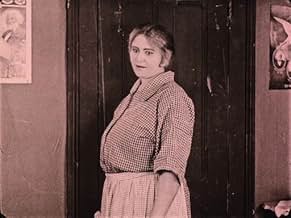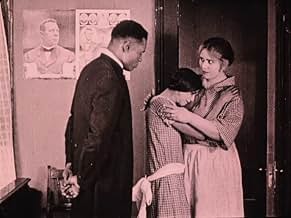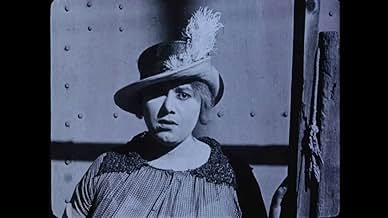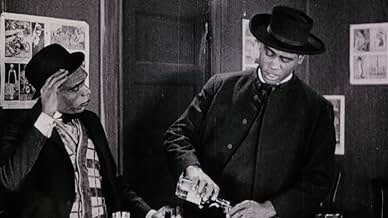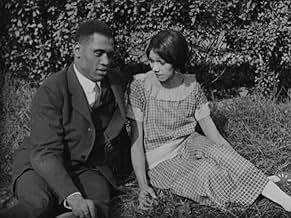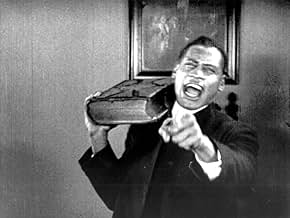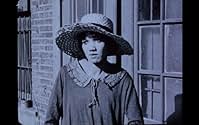IMDb रेटिंग
6.2/10
1.3 हज़ार
आपकी रेटिंग
अपनी भाषा में प्लॉट जोड़ेंA malevolent phony preacher plots to take advantage of a woman from his congregation who happens to be in love with his long-estranged identical twin brother.A malevolent phony preacher plots to take advantage of a woman from his congregation who happens to be in love with his long-estranged identical twin brother.A malevolent phony preacher plots to take advantage of a woman from his congregation who happens to be in love with his long-estranged identical twin brother.
- पुरस्कार
- कुल 1 जीत
Marshall Rogers
- Speakeasy Proprietor
- (as Marshall Rodgers)
Mercedes Gilbert
- Martha Jane - Her Mother
- (बिना क्रेडिट के)
Julia Theresa Russell
- Isabelle - the Girl
- (बिना क्रेडिट के)
फ़ीचर्ड समीक्षाएं
Two escaped fugitives bring ruin to an African-American community. One passes himself off as Rev. Isaiah T. Jenkins (Paul Robeson) and the other is his cellmate Yello-Curley' Hinds. The fake reverend corrupts a member of his congregation, Isabelle Perkins, who happens to love Sylvester, Jenkins' long-lost identical twin brother.
First, I don't like some of the text which tries to use colloquial black speech. It's downgrading but also makes it harder to understand. Maybe the black audience of the day feels more comfortable with that. This is to be black cinema made for a black audience. I'm willing to accept it for what it is. On the other hand, I don't think some of the plot points make sense.
The mother wouldn't buy Sylvester revealing himself as a reverend right after telling her daughter to find herself a reverend. The mother would assume that the young couple is faking it. I also don't think the twin brother idea works in this plot. Apparently, this movie was chopped up to satisfy the censors and maybe the longer version functions better. The main aspect that really works is the great Paul Robeson. He is the magnetic lead and he delivers compelling performances.
First, I don't like some of the text which tries to use colloquial black speech. It's downgrading but also makes it harder to understand. Maybe the black audience of the day feels more comfortable with that. This is to be black cinema made for a black audience. I'm willing to accept it for what it is. On the other hand, I don't think some of the plot points make sense.
The mother wouldn't buy Sylvester revealing himself as a reverend right after telling her daughter to find herself a reverend. The mother would assume that the young couple is faking it. I also don't think the twin brother idea works in this plot. Apparently, this movie was chopped up to satisfy the censors and maybe the longer version functions better. The main aspect that really works is the great Paul Robeson. He is the magnetic lead and he delivers compelling performances.
A very moving film for its time.I'm a big Paul Robeson fan and I'm glad TCM shows a lot of films with all Black casts.I think it should be shown along with the 1929 film "Hallelujah".It also has an all Black cast and has religion as its theme but it's not a silent film.This film ran a little too long but I never stopped watching.Touchy subject matter even today.Right on point even today!Even though Robeson found fame who knows what talent the others had that skin color stopped from them also becoming well known.That's why I love these films.The Black Church must have shunned this type of film back them and the actors couldn't have had an easy time of it.I'd call this a silent soap opera.The mother really loved her daughter a whole lot.Mercy!The daughter was the ultimate tragic figure.The Minister.One word-Sinister!
Body and Soul is an interesting film. Paul Robeson makes a powerful debut in this film about an escaped prisoner who blends into a small community as a beloved pastor. This film is an interesting period piece and was written, directed, and starred African-Americans in an era where that sort of thing wasn't done. Audiences today would be shocked at the stereotypical performances of the supporting cast and would be shocked that an African-American made this film. Well worth seeing for movie buffs. Robeson gives a great and powerful performance.
A melodrama involving a con man who (somehow) has assumed the role of a preacher (Paul Robeson), and along with an ex-cellmate, sets out to bilk the townspeople out of their money. He's also got his eye on a young woman (Julia Theresa Russell) who just so happens to prefer his kinder twin brother. Robeson turns in a reasonably strong performance in the dual role, even if the character of his twin is somewhat ridiculous. Russell is reasonably good too, and the rape scene told in flashback evokes horror and is well done, probably the film's best.
Overall the film suffers from a weak script, complete with an enormous "it was just a dream" cliché. Accounts vary as to whether the unsatisfying conclusion was due to the considerable problems Micheaux had getting it approved, which unfortunately resulted in a significant hack job. As it is though, it suffers from sloppy editing, has dangling plot points (like the ex-cellmate), and drags on for longer than it should have.
Looking at the film through the lens of today can also be troubling, because the dialogue the characters use is what we think of as stereotypical. As with other films from Micheaux, he unapologetically criticizes the African-American community. Later he would say this:
"I have always tried to make my photoplays present the truth, to lay before the Race a cross-section of its own life, to view the colored heart from close range. My results might have been narrow at times, due perhaps to certain limited situations which I endeavored to portray, but in those limited situations the Truth was the predominant characteristic. It is only by presenting those portions of the Race portrayed in my pictures in the light and background of their true state that we can raise our people to greater heights. I am too much imbued with the spirit of Booker T. Washington to ingraft false virtues upon ourselves, to make ourselves that which we are not. Nothing could be a greater blow to our own progress. The recognition of our true situation will react in itself as a stimulus for self-advancement."
Thus, we have this dialogue, and we have the church congregation falling for the lengthy sermons of a low-life who drinks alcohol out of what looks like a water glass while preaching. Micheaux and other black leaders like W.E.B. DuBois saw religion critically, and as something holding back African-American progress. That's something we also see in the film 'Within Our Gates.' The portrait of ignorance is not flattering, and some black filmgoers were not amused. One at the time likened it to D.W. Griffith's 'Birth of a Nation,' saying "One would expect a white screenwriter to fan the flames of hatred. But what can we say when a black man portrays our people in the same manner?" The white censors were also displeased, seeing in the evil traits of a minister, even a false one, as "sacrilegious, immoral, and would tend to incite to crime."
There is thus a brave honesty here, at least until that ending sequence, and for that I admire Micheaux. He also shows the vulnerability of women in the rape (although it's not the case that she's not believed - in fact it's the opposite, her mother and the congregation believe her and attack the culprit). While rough around the edges, there's a certain power in being a film from a legendary African-American director and featuring the debut of a star, Robeson, who was incredibly multi-faceted and should be better known. Both have done better work, but I'm glad I saw this one, and it's worth checking out.
Overall the film suffers from a weak script, complete with an enormous "it was just a dream" cliché. Accounts vary as to whether the unsatisfying conclusion was due to the considerable problems Micheaux had getting it approved, which unfortunately resulted in a significant hack job. As it is though, it suffers from sloppy editing, has dangling plot points (like the ex-cellmate), and drags on for longer than it should have.
Looking at the film through the lens of today can also be troubling, because the dialogue the characters use is what we think of as stereotypical. As with other films from Micheaux, he unapologetically criticizes the African-American community. Later he would say this:
"I have always tried to make my photoplays present the truth, to lay before the Race a cross-section of its own life, to view the colored heart from close range. My results might have been narrow at times, due perhaps to certain limited situations which I endeavored to portray, but in those limited situations the Truth was the predominant characteristic. It is only by presenting those portions of the Race portrayed in my pictures in the light and background of their true state that we can raise our people to greater heights. I am too much imbued with the spirit of Booker T. Washington to ingraft false virtues upon ourselves, to make ourselves that which we are not. Nothing could be a greater blow to our own progress. The recognition of our true situation will react in itself as a stimulus for self-advancement."
Thus, we have this dialogue, and we have the church congregation falling for the lengthy sermons of a low-life who drinks alcohol out of what looks like a water glass while preaching. Micheaux and other black leaders like W.E.B. DuBois saw religion critically, and as something holding back African-American progress. That's something we also see in the film 'Within Our Gates.' The portrait of ignorance is not flattering, and some black filmgoers were not amused. One at the time likened it to D.W. Griffith's 'Birth of a Nation,' saying "One would expect a white screenwriter to fan the flames of hatred. But what can we say when a black man portrays our people in the same manner?" The white censors were also displeased, seeing in the evil traits of a minister, even a false one, as "sacrilegious, immoral, and would tend to incite to crime."
There is thus a brave honesty here, at least until that ending sequence, and for that I admire Micheaux. He also shows the vulnerability of women in the rape (although it's not the case that she's not believed - in fact it's the opposite, her mother and the congregation believe her and attack the culprit). While rough around the edges, there's a certain power in being a film from a legendary African-American director and featuring the debut of a star, Robeson, who was incredibly multi-faceted and should be better known. Both have done better work, but I'm glad I saw this one, and it's worth checking out.
I learned of Oscar Micheaux from Melvin Van Peebles's documentary "Classified X", about the history of cinema produced and directed by African-Americans. I recently saw Micheaux's "Veiled Aristocrats", and have now seen his "Body and Soul".
For the most part, it's a good movie, with Paul Robeson playing a con artist posing as a clergyman. However, there's one thing that's grating about it, and this might just be a 21st-century view of it: the dialogue on the intertitles. It sounds like stereotyped depictions of African-Americans. Maybe Micheaux was writing the actors' actual dialects, but to me it sounded like it came from a minstrel show. On that subject, after Willie Mays died recently, Keith Olbermann recalled a phone that he'd had with Mays, where Mays affected what sounded like a minstrel show voice (Olbermann didn't imitate it, noting that for a white person to do so would sound incredibly racist).
Anyway, it's an okay movie on its own, with fine performances all around. Just remember that the dialogue on the intertitles sounds cringey nowadays.
For the most part, it's a good movie, with Paul Robeson playing a con artist posing as a clergyman. However, there's one thing that's grating about it, and this might just be a 21st-century view of it: the dialogue on the intertitles. It sounds like stereotyped depictions of African-Americans. Maybe Micheaux was writing the actors' actual dialects, but to me it sounded like it came from a minstrel show. On that subject, after Willie Mays died recently, Keith Olbermann recalled a phone that he'd had with Mays, where Mays affected what sounded like a minstrel show voice (Olbermann didn't imitate it, noting that for a white person to do so would sound incredibly racist).
Anyway, it's an okay movie on its own, with fine performances all around. Just remember that the dialogue on the intertitles sounds cringey nowadays.
क्या आपको पता है
- ट्रिवियाFilm debut of Paul Robeson.
- गूफ़Mother Martha Jane looks through her Bible for the saved money to show it to the sisters, but it's missing. She leaves the book on the table and while searching through some drawers, three shots of the sisters show no book on the table. When the mother returns to the table, the book is back.
- भाव
Yello-Curley' Hinds - the Phony Reverend's Former Jailmate: I tell you that I was not seekin' you out, but dropped off here to find girls for 'Cotton Blossom's Shoulder Shakers' - - and this little Isabelle - - she appeals to muh!
- इसके अलावा अन्य वर्जनRaymond Rohauer, Inc. copyrighted a restored version in 1979 with a music track and new credits. The music was composed and performed by Lee Erwin and was recorded at Carnegie Hall Cinema, New York. It's running time is 83 minutes.
- कनेक्शनFeatured in Black Shadows on a Silver Screen (1975)
टॉप पसंद
रेटिंग देने के लिए साइन-इन करें और वैयक्तिकृत सुझावों के लिए वॉचलिस्ट करें
- How long is Body and Soul?Alexa द्वारा संचालित
विवरण
- चलने की अवधि
- 1 घं 42 मि(102 min)
- ध्वनि मिश्रण
- पक्ष अनुपात
- 1.33 : 1
इस पेज में योगदान दें
किसी बदलाव का सुझाव दें या अनुपलब्ध कॉन्टेंट जोड़ें

